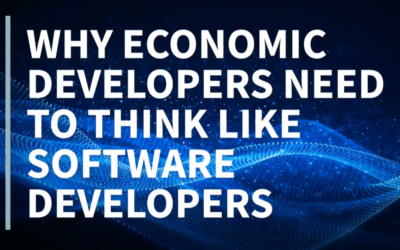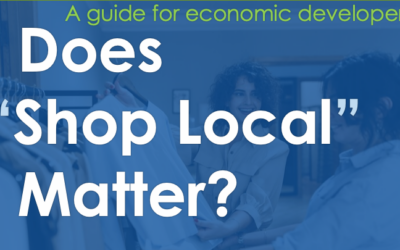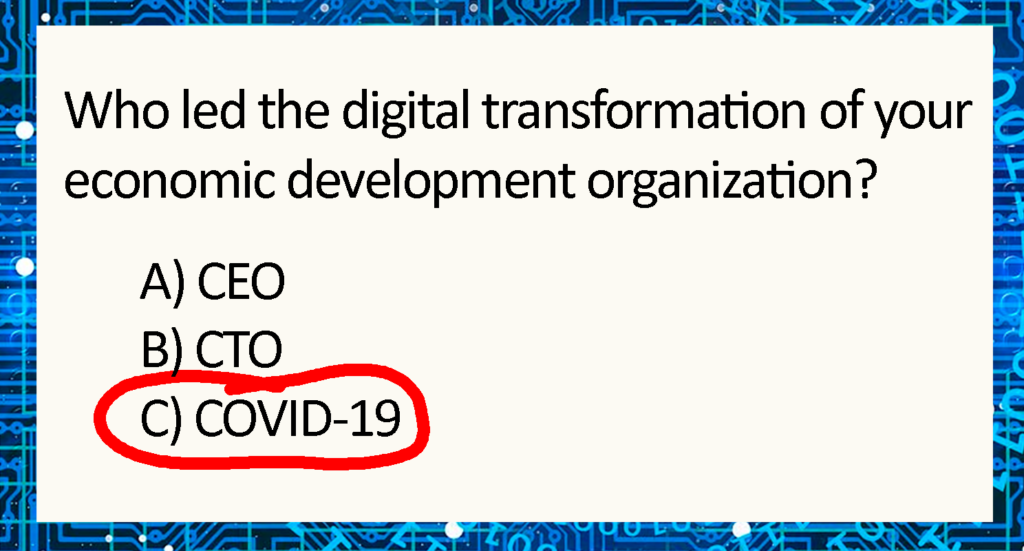
The digital transformation of economic development is inevitable. The benefits of technology are too powerful for any organization to reject without disadvantaging themselves. However, COVID-19 has rapidly accelerated this trend, turning multi-year digitization plans into immediate implementation realities.
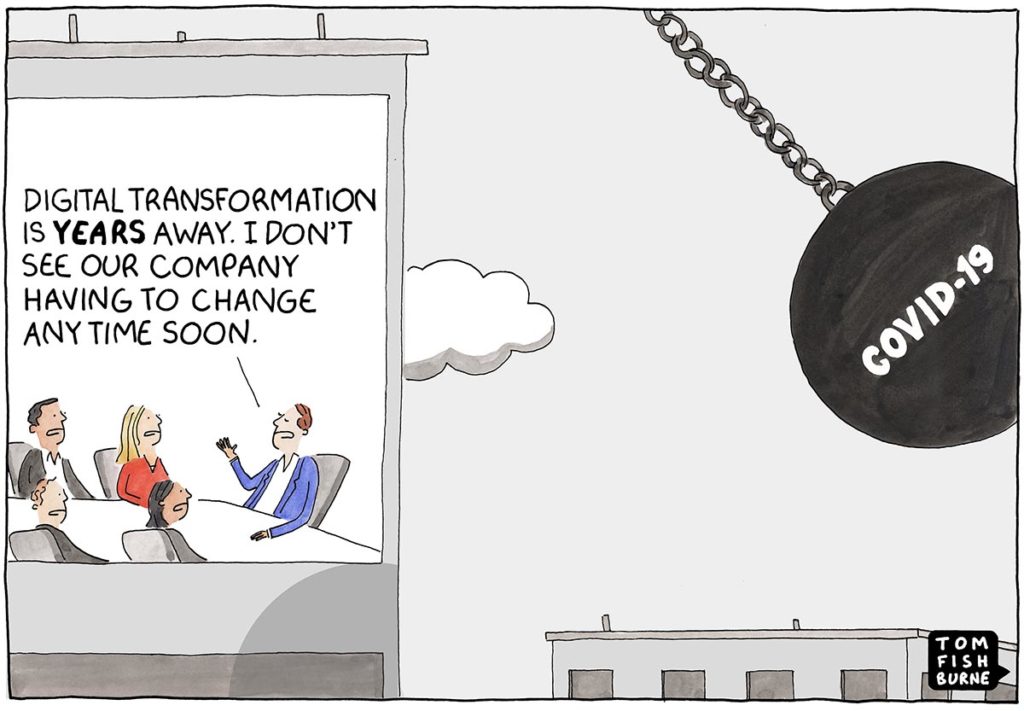
The profession of economic development has gradually become more digital over time through the adoption of software, websites, smart-devices, data, and online services to improve internal processes and better serve customers. While it was temporarily possible to survive as an underperforming digital laggard in the past, the coronavirus pandemic has eviscerated this dynamic. It is now forcing all effective economic development organizations (EDOs) to embrace rapid digital transformation or suffer substantial ineffectiveness.
The change in reliance on technology to support economic development activities is vividly apparent based on data about economic developers’ new behavior. The use of technology to work with economic development co-workers and to serve customers are the third and fourth highest ranked changes in professional practices since the start of the coronavirus pandemic.
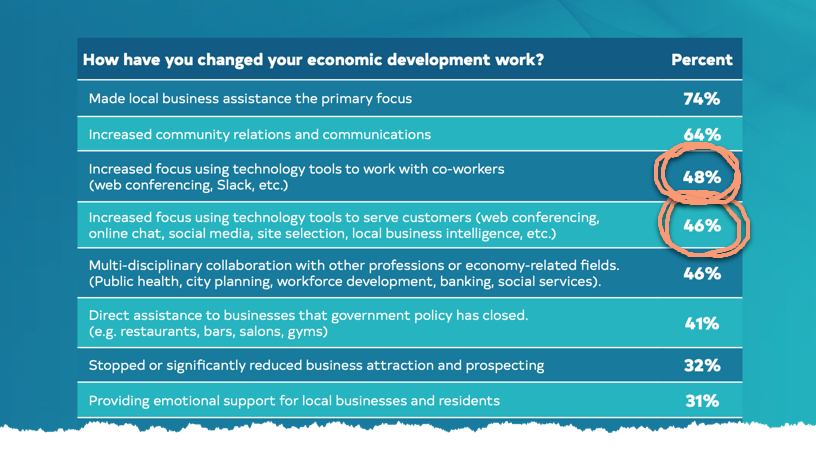
The new reality is that economic developers are adopting new or greater use of software because it is necessary to get their job done. As an example of the transition, in the past, some economic developers focused their work around face-to-face interactions through meetings, travel, conferences, and trade missions.[1] COVID-19 has diminished the viability of these types of practices, forcing economic developers to replace them with digital strategies that will work today and into the future. The following are examples of how economic developers are making digital transformations in their organizations that have positively impacted their practices, programs, and operations.
1. Local Small Business Assistance
The economic crisis shone a light on the reality that the most important businesses for EDOs are those already in a community because they are the real economy that employs people, generates taxes, and provide the infrastructure for the health of the economy. Economic developers pivoted from whatever they were doing pre-coronavirus to put intensive effort toward helping local businesses. Even regional marketing organizations that previously exclusively performed business recruitment adjusted to meet the next normal for the economic development profession.
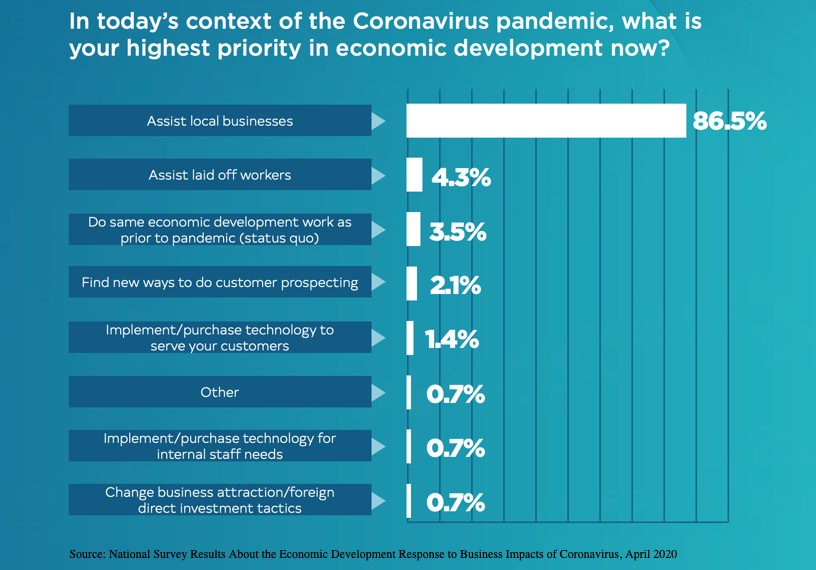
In a response to public health policies many businesses closed down to prevent the spread of coronavirus. Even businesses that remained open or have reopened are operating at a limited capacity.
- Local business owners (many of which are still at home) are thinking about how they can improve business and gain back lost revenues once things reopen to the new normal. Businesses that are opening are looking for solutions to jumpstart back into business.
- Entrepreneurial workers are having time to plan the business they’ve always dreamed of so they can open them.
- Laid-off workers may have no choice but to pursue some type of self-employment as unemployment is historically high and is likely to remain so.
All of these audiences need direct help and personal assistance (from SBDCs, SCORE, SBA, etc.) in which high demand is likely going to exceed capacity leaving support in short supply. With scarce ability to go and sit down with any business advice experts because of social distancing, online resources have become one of the only options available to plan for their new business or to resurrect their current company.
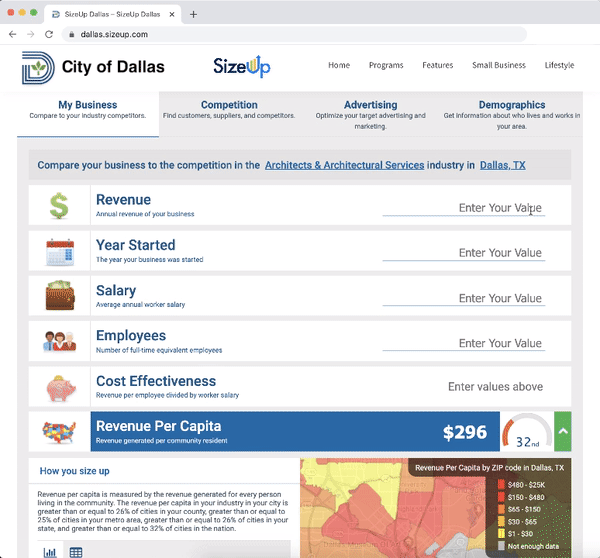
In response, the implementation of SizeUp software on EDO websites grew incredibly quickly to serve the needs of local businesses and aspiring entrepreneurs, which really matters as new businesses are going to be necessary to replace those that have closed permanently. Fortunately, economic data from the Federal Reserve Bank shows that business applications are spiking up significantly. EDOs can help accelerate this trend in their community and help these entrepreneurs by providing them the right information for success. Many new entrepreneurs do not have the business background to do market research or to test/validate their assumptions about their business, but with online services they can be empowered to do so.
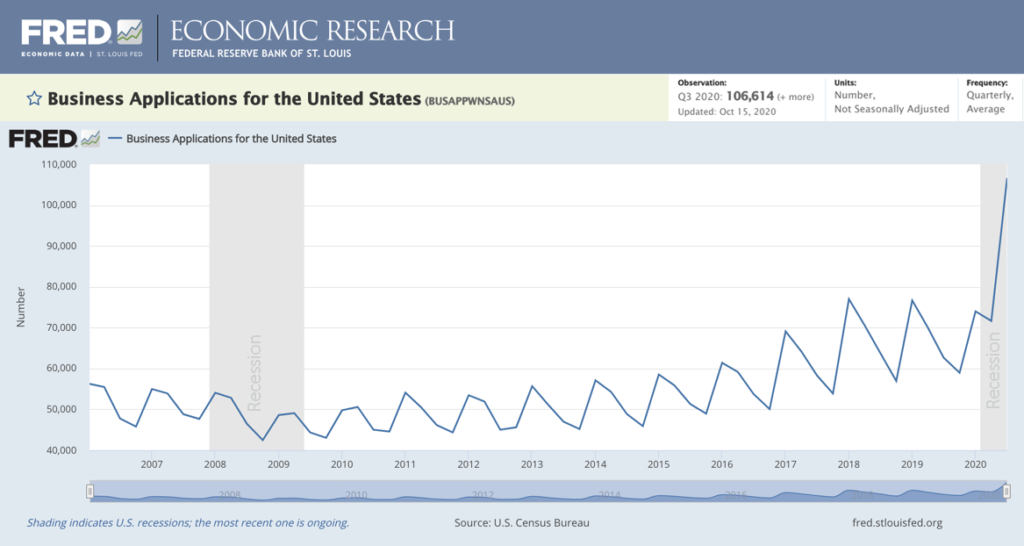
2. Client Relationship Management
Economic development is an operationally mobile profession. Prior to the coronavirus pandemic, economic developers often held out of the office meetings with local businesses, elected officials, strategic partners, or prospective investors – sometimes anywhere in the world. Coronavirus didn’t change the decentralized nature of how economic development is practiced; travel was just replaced with the new decentralization of “work from home.”
Prior to COVID-19, EDpros (economic development professionals) may have shared information orally with coworkers when they were in the office, but this was always a perilous way of tracking project progress. It has the added liability of losing valuable information stored only in someone’s brain if a staff person leaves the organization, which eventually happens.
Information management, especially for remote teams, is necessary to create a common, client-focused knowledgebase. An effective CRM for EDOs integrates marketing, projects/programs, and customer service (also referred to as “after care,” “BRE,” and “investor development”) functions, which makes it easier for everyone inside an EDO to work together and share critical information. Coronavirus has accelerated the implementation of this technology with EDOs although its eventual use was necessary anyway.
With some EDOs still working on Excel spreadsheets, which can be accidently erased or copied, the need to have your CRM on the cloud has never been more important.
Although standard CRMs like Salesforce, Zoho, Hubspot, and Copper are used, because economic development is highly specialized, profession-focused CRMs exist to address the unique needs of EDpros including offerings from Wavteq, Cloud Nine, and Executive Pulse.
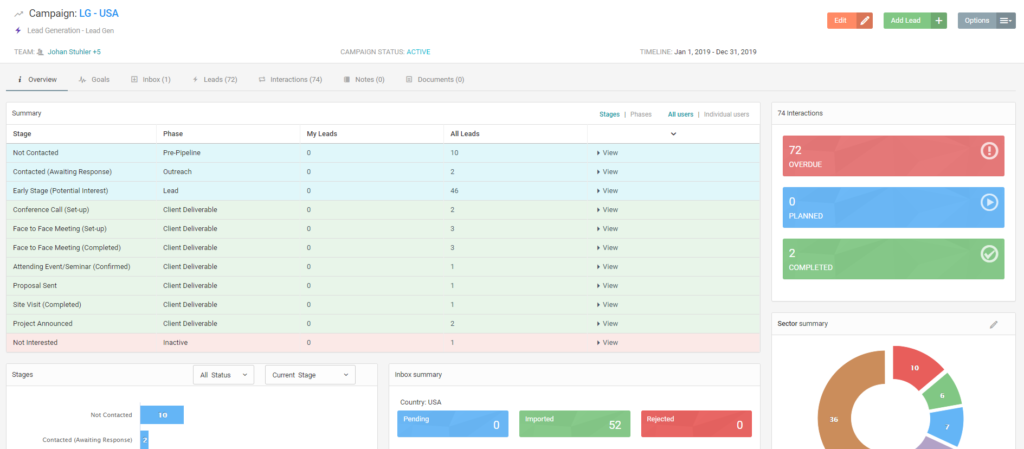
A challenge for many EDOs, even including those with CRMs implemented, was that when COVID-19 caused businesses to shut-down, many EDOs didn’t have contact information for all the businesses in their area when they needed to be able to communicate with them. To fill this data gap, EDOs were able to get the data from companies that collect or license this data such as Dunn & Bradstreet and Database USA. Having access to contact information in internal systems is the fastest way to reach local businesses.
3. Business Promotion
The coronavirus pandemic closed some businesses while leaving others open with new restrictions. At the height of the lockdown, consumers often didn’t know which businesses were open or what services/goods they could get locally without physically going to the business to discover the answer for themselves. This approach was incredibly inconvenient, especially at a time when people were sheltering at home.
At the same time, local businesses were in crisis because much of their revenue had stopped due to closures. This was not only bad for the business; it was also damaging for the local economy, local workforce, and represented a drop-off of taxes for local government. Because of these challenges, EDOs launched a new service on their website to promote the businesses by providing information about the companies and industries that were open, hours they were available, and how people could buy (pick-up, delivery, online) using ZoomBusiness software from GIS Planning.
Businesses benefited from this online program because they received free marketing and were able to effectively communicate their offerings. EDOs benefited by helping their local businesses attract customers which also generated goodwill for them amongst their business community. Many of them partnered in promoting this online service with local chambers of commerce, who benefited by protecting and potentially growing their membership, and local media, who benefit by supporting their local advertisers.
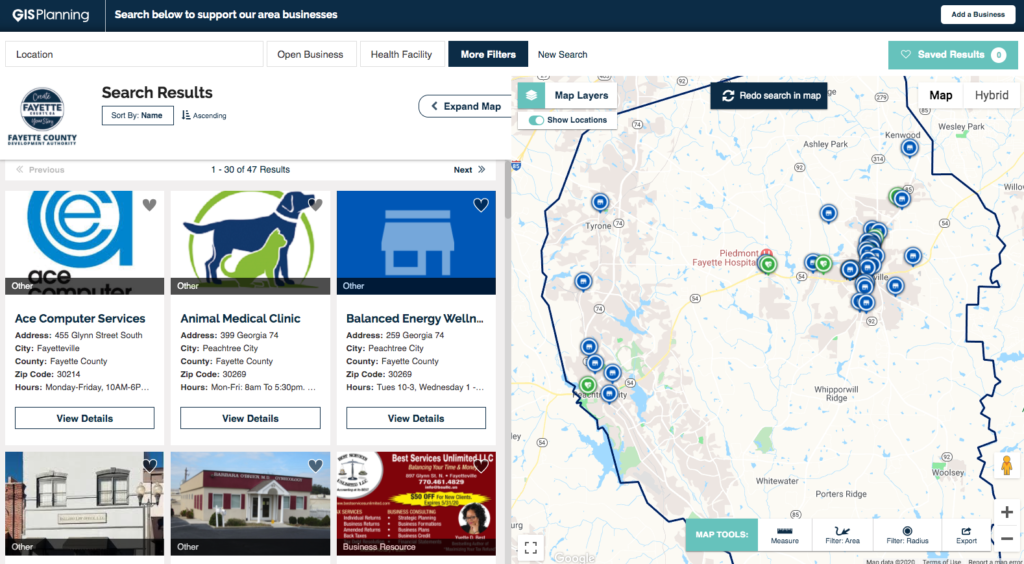
4. Virtual Reality
The days of airline travel involving anyone walking directly to the boarding gate changed after 9/11 and will continue to change as a result of public health risks surfaced by COVID-19. It also takes a lot of time with long trips, sometimes only for short meetings.
Businesspeople and economic developers are learning there are ways to reduce the misery associated with airline travel by replacing it with technology alternatives. Businesspeople and site selection advisors could only personally visit as many locations and take meetings with as many EDOs as they could physically get to. What has changed is that now virtual reality is a quality alternative that is becoming more pervasive and affordable.
Virtual reality can be used for all stages and audiences of economic development including existing and prospective businesses. As an example, for the early stages of site selection, virtual reality can increase the volume of places that can be visited and businesses that can be met with before a physical visit is necessary. Economic development marketing agency Golden Shovel Agency has been at the forefront of this movement with its introduction of PlaceVR for EDOs, a service that has grown in demand as a result of COVID-19.
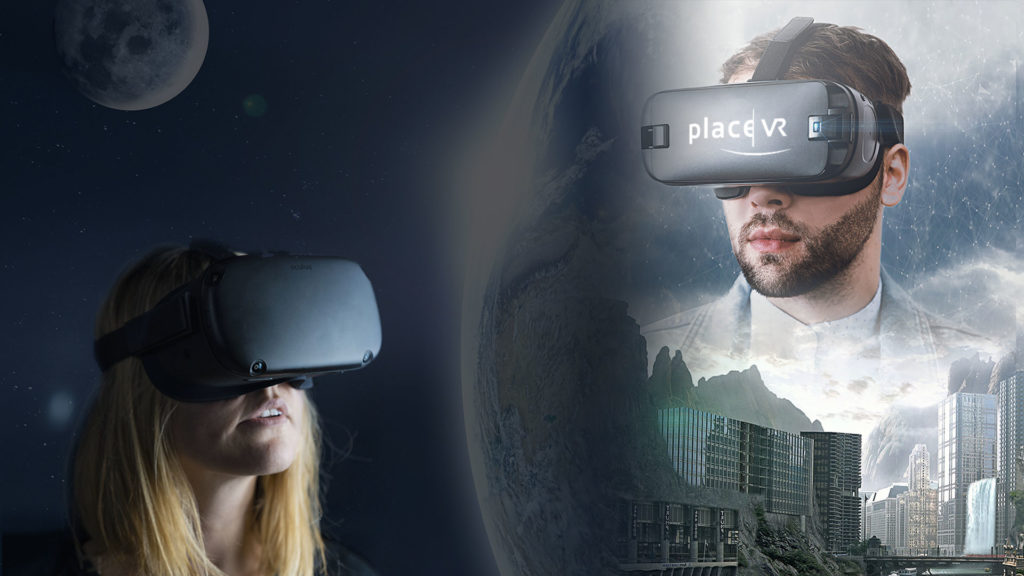
5. On-demand Professional Development
Professional development has always been an important asset to EDOs, so their staff improves their skills and knowledge of the latest economic development trends and technology. Traditionally, this training was provided through in-person trainings or at conferences.
As COVID-19 resulted in the cancellations of most economic development conferences and travel because a human resources risk that EDOs were unwilling to take, professional development went online. This transition revealed that professional training in-person was not necessary and that high-priced traditional trainings were an unnecessary cost with lost time from travel that revolved around the schedule of the organization hosting the training.
Online professional development reduces the cost, eliminates wasted travel time, and is available on-demand to accommodate the busy schedules of the EDpro.
An example of this innovation is the Wavteq Institute eLearning that launched in November 2019. Professionals taking the training can receive foreign direct investment (FDI) accreditation through the education accessed on the online platform, and is used by organizations such as Caribbean Export, Dubai FDI and Select USA. Coupled with exclusive industry blueprints and an “essential publications” page, this can turn into an EDO’s FDI knowledge center.
There is certainly financial risk for traditional economic development training organizations now that their EDpro customers have experienced a faster, cheaper, and more convenient alternative. This should be a motivation for them to reinvent their services to use technology which can reduce their costs and expand the size of their addressable market.
While online education had already been proven out as a successful model, it was COVID-19 that woke economic developers up to this viable alternative.
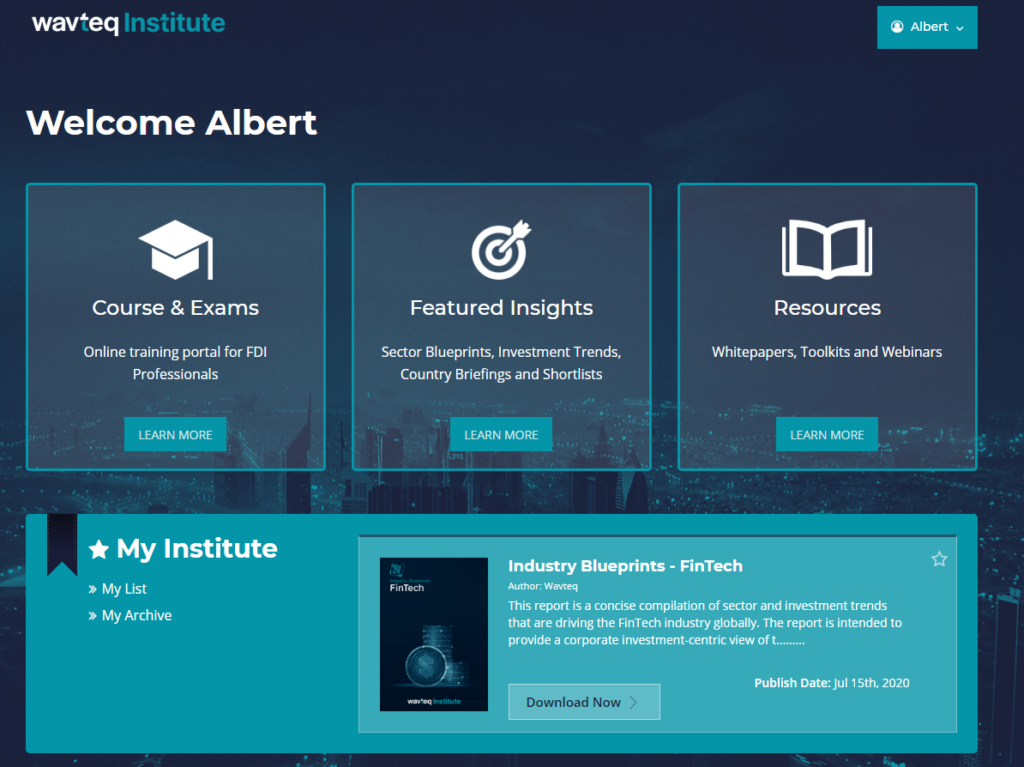
6. Video Conferencing
Video meetings and webinars very quickly became a common way of economic developers communicating with small and large groups. Video meetings became so common that people started having “Zoom fatigue,” which was surprising considering many people has never even heard of Zoom before COVID-19.
Additionally, EDOs were able to leverage webinar technology to share information with their business community. Weekly webinars for business education, response to the coronavirus pandemic, and general communication were quickly added to the services provided by EDOs.
Web meetings were a common but not regular technology use of EDOs prior to COVID-19. However, presently they are ubiquitous in business and personal life. This is now simply a way that it is expected for meetings to occur, especially group meetings. EDOs need to implement web conferencing software that is appropriate for business. When choosing a web meeting product, a balance in terms of accessibility and security depending on the level of confidentiality necessary for meetings needs to be considered. Also, free web meetings software with limitations on time length should be replaced with enterprise subscriptions.
7. Online Collaboration
Because economic development professionals were physically separated while working from home, collaboration on projects and documents transitioned to online collaboration. Software as a Service such as Google Suite enabled economic developers to collaborate on documents to see each other’s work, edits, and suggestions in real time. Although Microsoft Office has largely been known as personal desktop software and a laggard compared to online-only tools like Google and other web-based office suite in the new, collaborative workspace, it too now has the ability for real-time online collaboration.
To manage projects economic developers are starting to work more like software engineers and traditionally tech-focused software like Slack is being used by EDOs so staff can communicate in real time and track progress on projects.
8. Business Prospecting
Prospecting to find businesses that might be a fit for an investment expansion into a community has changed from historic practices such as trade shows into a more accurate and targeted method of using database analysis to find better opportunities to pursue. Coronavirus has simply accelerated this trend as old practices of face-to-face meetings have become impractical.
The use of data about companies have enabled EDOs to be more precise in discovering and pursuing companies that are a good match for their communities. As a leading example, fDi Markets, a service from the Financial Times, provides EDOs with a comprehensive, global online database of crossborder greenfield investments, covering industries worldwide. When subscribed to the database EDOs can access real-time monitoring of investment projects, capital investment and job creation. The service is designed to help EDOs generate leads, understand foreign direct investment trends, and gain valuable intelligence on target companies. The software also provides early warning signals that a company may be expanding internationally.
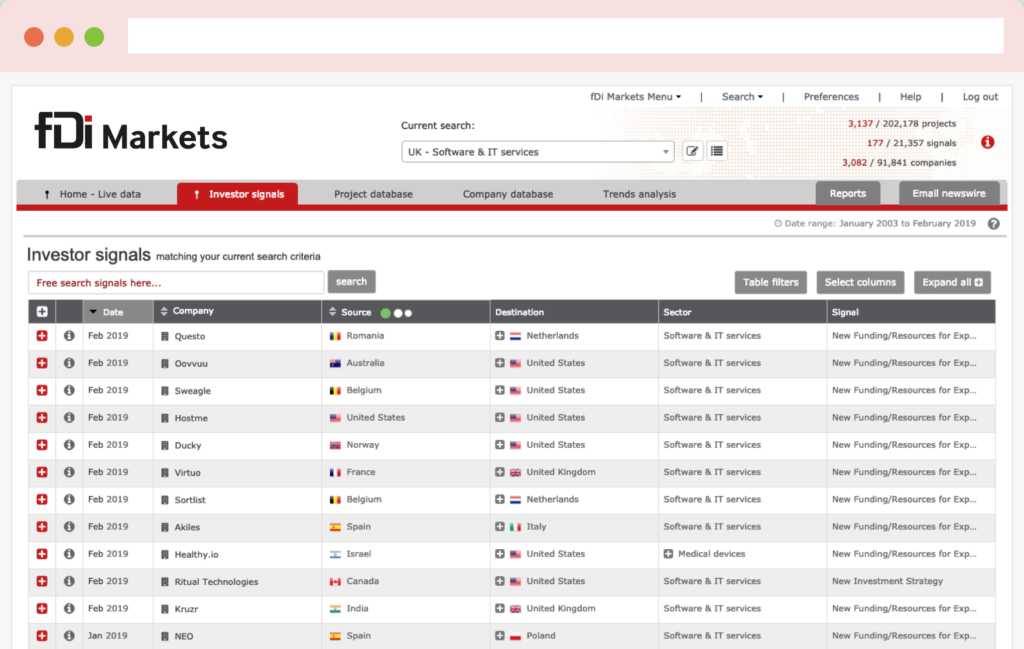
9. Websites
The foundation of every EDOs digital strategy is its website. However, the immediate economic crisis created by coronavirus revealed the importance of being able to have immediate updates to communicate information. This was evident with rapidly changing business dynamics created by the novel coronavirus. Economic developers that relied on updates to be made by the city’s webmaster had to wait in line for service while those that relied completely on outsourced website updates weren’t able to post information at the speed businesses needed it. The need for speed in communication has put all EDOs in the position that they must have direct access to control content on their websites using easy to use Content Management Systems. This is standard in EDO website systems such as those provided by leading EDO website development agencies like Golden Shovel Agency, Development Councellors International, and Marketing Alliance.
Impacts of Digital Transformation
EDOs that do not digitally transform their operations will find their organization and community at a competitive disadvantage because technology deficiency impedes EDOs’ ability to effectively deliver services for colleagues, businesses, and residents. As EDOs decide which technologies to adopt and continue implementing it is important that they select the highest quality technology solutions to accomplish their mission and not simply take a technology approach that checks off a list of services that should be provided, but which are sub-standard.
COVID-19 exposed the essential function of technology for communication and delivery of mission-critical economic development services. For example, online services provided by EDOs on their websites produced positive results in challenging circumstances as a means of effectively providing vital services, communicating information, and delivering data that new, existing, and prospective businesses needed. The technology experiments that deliver wins during the coronavirus pandemic will solidify their ongoing use.
Technology is a growth practice for all modern organizations. Online services will be a foundational piece of economic development into the future.
[1] Luddites may make the same argument that has been made many times before, which is that no communication is better than face-to-face communication. Yet all of us perform a huge amount of our work using the technology tools that past generations have said could not replace face-to-face communication such as mail, telephone, fax, email, and video conferencing. All of these all technologies are not face-to-face but have their own advantages and disadvantages over face-to-face communication.

